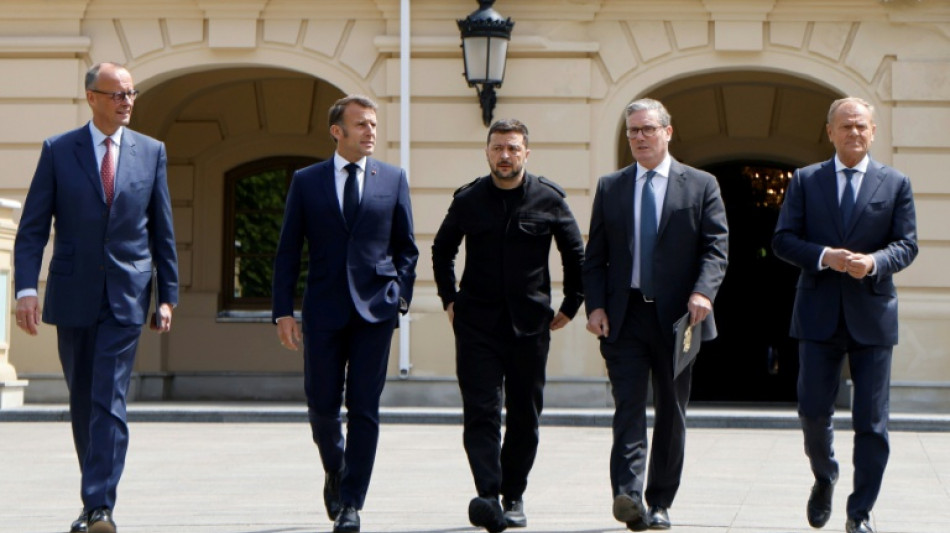
Ukraine allies set ultimatum to Russia for 30-day ceasefire

Kyiv's allies pressed Russia on Saturday to accept a 30-day unconditional ceasefire in Ukraine from Monday, threatening Moscow with coordinated sanctions if it did not agree to the demand.
The ultimatum came during a joint press conference in Kyiv attended by Ukrainian President Volodymyr Zelensky and the leaders of France, Germany, the UK and Poland.
The proposal united allies including the United States, they said.
The unprecedented visit was the first time the leaders of the four European nations had made a joint trip to Ukraine.
"We have just now... decided to support a ceasefire which will begin next Monday, without any preconditions," France's Emmanuel Macron said.
Around 20 member countries of the "coalition of the willing" supporting Ukraine had held a videoconference with Macron, German Chancellor Friedrich Merz, British Prime Minister Keir Starmer, Polish Prime Minister Donald Tusk and Zelensky.
"In the event of a violation of this ceasefire, we have agreed that massive sanctions will be prepared and coordinated between Europeans and Americans," Macron said.
The United States and Ukraine have been for weeks pushing for a similar proposal, which Russia has not accepted.
- 'Absolute unity' -
Washington has threatened to walk out of talks over the lack of progress to stop the war, which US President Donald Trump had said during his campaign that he could end swiftly.
Kyiv and Western allies feared that Trump was pivoting towards Moscow's position, because he has clashed with Zelensky, but the White House recently showed growing impatience with Putin.
"The position we've now got to today is absolute unity across a whole range of countries around the world, including the United States, that there must be that 30-day unconditional ceasefire," Starmer said.
The five leaders in Kyiv held a "fruitful" call with Trump to update him on the results of the meeting, Ukrainian Foreign Minister Andriy Sybiga said.
"For the first time in a long time we had a feeling that the whole free world is truly united," Tusk said.
"We know that the real test is before us and before Putin. We will be waiting for Russia's reaction."
European Commission President Ursula von der Leyen also expressed support for the truce that she said "must be implemented without pre-conditions to pave the way for meaningful peace negotiations".
- 'To build peace' -
Macron said the ceasefire "will be monitored mainly by the United States of America, to which all Europeans will contribute", and that the truce would pave the way for "immediate work and negotiations with parties involved to build a robust and lasting peace".
The French leader has not been to Kyiv since June 2022, when he went with the Italian and German leaders of the time.
The European leaders were later seen embracing Zelensky and joined him in placing lanterns at a memorial for fallen soldiers in central Kyiv.
For Merz, who took office only this week, it was his first visit to Ukraine as chancellor.
The symbolic show of European unity came a day after Russian President Vladimir Putin struck a defiant tone at a Moscow parade marking 80 years since victory in World War II.
In an interview with the US news channel ABC on Saturday, Kremlin spokesman Dmitry Peskov said arms deliveries from Ukraine's allies would have to stop before Russia would agree to a ceasefire.
A truce would otherwise be an "advantage for Ukraine" at a time when "Russian troops are advancing... in quite a confident way" on the front, Peskov said, adding that Ukraine was "not ready for immediate negotiations".
The Kremlin on Saturday denounced Europe's "confrontational" attitude towards Russia -- without directly responding to a proposition by Kyiv's allies for a 30-day ceasefire in Ukraine.
Putin ordered a unilateral three-day truce from Thursday through Saturday. But a Ukrainian army brigade operating in the east told AFP earlier the intensity of fighting had remained "pretty much the same".
brw/oc/yad
N.Hong--SG

 London
London

 Manchester
Manchester
 Glasgow
Glasgow
 Dublin
Dublin
 Belfast
Belfast
 Washington
Washington
 Denver
Denver
 Atlanta
Atlanta
 Dallas
Dallas
 Houston Texas
Houston Texas
 New Orleans
New Orleans
 El Paso
El Paso
 Phoenix
Phoenix
 Los Angeles
Los Angeles


